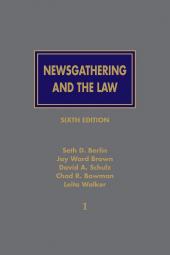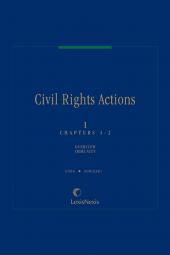Newsgathering and the Law
Select a format
 International Order Inquiry
International Order Inquiry
Select subscription type
Terms & conditions
Subscribers receive the product(s) listed on the Order Form and any Updates made available during the annual subscription period. Shipping and handling fees are not included in the annual price.
Subscribers are advised of the number of Updates that were made to the particular publication the prior year. The number of Updates may vary due to developments in the law and other publishing issues, but subscribers may use this as a rough estimate of future shipments. Subscribers may call Customer Support at 800-833-9844 for additional information.
Subscribers may cancel this subscription by: calling Customer Support at 800-833-9844; emailing customer.support@lexisnexis.com; or returning the invoice marked "CANCEL".
If subscribers cancel within 30 days after the product is ordered or received and return the product at their expense, then they will receive a full credit of the price for the annual subscription.
If subscribers cancel between 31 and 60 days after the invoice date and return the product at their expense, then they will receive a 5/6th credit of the price for the annual subscription. No credit will be given for cancellations more than 60 days after the invoice date. To receive any credit, subscriber must return all product(s) shipped during the year at their expense within the applicable cancellation period listed above.
The total price includes the product(s) listed in the Order Form and any Updates for a limited period (minimum period of 30 days) after the order is placed ("Order Window"). Shipping and handling fees are not included in the grand total price.
All shipments may be returned, at subscribers' expense, for full credit of the Price within 30 days of receipt.
Shipments may not be returned, and no credits will be issued, more than 30 days after receipt.
After the Order Window, subscribers will receive notice of Updates along with the then-current grand total price and order process as Updates become available. Subscribers will only be shipped those Updates they specifically request.
Product description
View a sample of this title using the ReadNow feature
It is time you learned from the experts.
The legal protections for—and limitations on—the news media in gathering information for the public are splashed across the headlines. Access to sometimes secret governmental proceedings and records, undercover media investigations, newsgathering in virtual spaces, unauthorized recording, and subpoenas to reporters for their sources and their unpublished materials are the real business of those practicing in the area. There is no better time than now to negotiate newsgathering issues with the experts. In Newsgathering and the Law, Sixth Edition, Seth D. Berlin, Jay Ward Brown, David A. Schulz, Chad R. Bowman, and Leita Walker, each with decades of practical experience advising and defending journalists and news organizations on First Amendment and media law issues, share their combined life's work with you.
The Sixth Edition includes a new chapter analyzing efforts to seal case dockets, the names of litigants, and entire court files, as well as newly added discussions of a host of other legal developments since the Fifth Edition was published, ranging from pandemic-era advances in courtroom technology to online newsgathering, the now-robust body of case law protecting the right to record the police, and the growing body of law invalidating statutes punishing journalists (and others) from gaining access to, and reporting on, private businesses. These hundreds of pages of additional analysis make the new edition a must read for scholars and practitioners alike.
eBooks, CDs, downloadable content, and software purchases are noncancelable, nonrefundable and nonreturnable. Click here for more information about LexisNexis eBooks. The eBook versions of this title may feature links to Lexis+® for further legal research options. A valid subscription to Lexis+® is required to access this content.
Table of contents
VOLUME 1
CHAPTER 1 INTRODUCTION: FASHIONING THE NEWSGATHERING RIGHT
§ 1.01 The Principle of Freedom of Expression
§ 1.02 The Rationale of Preference
§ 1.03 The Right to Acquire Information and the Right to Know
§ 1.04 Freedom of the Press
§ 1.05 Newsgathering and the Right of Access
CHAPTER 2 ACCESS TO JUDICIAL PROCEEDINGS: THE CONSTITUTIONAL FRAMEWORK
§ 2.01 The Constitutional Law of Fair Trial/Free Press
§ 2.02 The Constitutional Right of Access in the Supreme Court
§ 2.03 Procedural Requirements
§ 2.04 Access to Dockets
§ 2.05 Justice Department Guidelines
CHAPTER 3 FOUNDATIONAL ACCESS: DOCKETS, CASES, AND PARTIES’ IDENTITIES
§ 3.01 Introduction
§ 3.02 Access to Dockets
§ 3.03 Access to Parties’ Identities and the Use of Pseudonyms
§ 3.04 Access to Concluded Proceedings
CHAPTER 4 ACCESS TO JUDICIAL PROCEEDINGS: THE LOWER COURTS
§ 4.01 Criminal Proceedings
§ 4.02 Civil Proceedings
§ 4.03 Civil Commitment Proceedings
CHAPTER 5 TECHNOLOGY IN THE COURTROOM
§ 5.01 Introduction
§ 5.02 Supreme Court Precedent
§ 5.03 Federal Court Proceedings
§ 5.04 State Court Proceedings
§ 5.05 Instant Communications Inside the Courtroom
CHAPTER 6 ACCESS TO JUDICIAL RECORDS: CRIMINAL PROCEEDINGS
§ 6.01 Sources of the Access Right
§ 6.02 Records of Criminal Proceedings
CHAPTER 7 ACCESS TO JUDICIAL RECORDS: CIVIL PROCEEDINGS
§ 7.01 Records in Civil Proceedings—In General
§ 7.02 Discovery Materials
§ 7.03 Settlement Agreements
§ 7.04 Court Files
§ 7.05 Other Civil Court Records
§ 7.06 Bankruptcy Court Records
CHAPTER 8 GAG ORDERS AND ACCESS TO PARTICIPANTS IN THE JUDICIAL PROCESS
§ 8.01 Participants in the Judicial Process
§ 8.02 Attorneys
§ 8.03 Restrictions on Paying Witnesses for Interviews
CHAPTER 9 ACCESS TO VOIR DIRE AND JURY INFORMATION
§ 9.01 Introduction
§ 9.02 Access to Jury Proceedings
§ 9.03 Jury Records
§ 9.04 Interviews with Jurors
CHAPTER 10 SPECIAL CONSIDERATIONS INVOLVING MILITARY TRIBUNALS, NATIONAL SECURITY AND CLASSIFIED INFORMATION
§ 10.01 Introduction
§ 10.02 Access to Military Tribunals
§ 10.03 Access to the Foreign Intelligence Surveillance Court
§ 10.04 Classified Information in Criminal Prosecutions
§ 10.05 Classified Information in Civil Proceedings
§ 10.06 National Security Letters
CHAPTER 11 ACCESS TO JUVENILE COURTS
§ 11.01 Juvenile Proceedings
§ 11.02 Juvenile Records
CHAPTER 12 ACCESS TO THE EXECUTIVE AND LEGISLATIVE BRANCHES
§ 12.01 Access to Executive and Legislative Events
§ 12.02 Constitutional Overview
§ 12.03 Nonstatutory Access to Executive Events
§ 12.04 Non-Statutory Access to Legislative Proceedings
§ 12.05 Non-Statutory Access to Administrative Proceedings
§ 12.06 Statutory Access to Federal Government Meetings
§ 12.07 Statutory Access to Meetings of State and Local Government
CHAPTER 13 ACCESS TO PUBLIC PLACES AND EVENTS
§ 13.01 Prisons and Prisoners
§ 13.02 Executions
§ 13.03 Disaster, Accident and Crime Scenes
§ 13.04 Voters and Polling Places
§ 13.05 Military Operations
VOLUME 2
CHAPTER 14 ACCESS TO FEDERAL GOVERNMENT RECORDS
§ 14.01 Introduction
§ 14.02 The Freedom of Information Act
§ 14.03 Access to Records Under the Federal Advisory Committee Act
§ 14.04 Presidential Records Act
CHAPTER 15 ACCESS TO STATE GOVERNMENT RECORDS
§ 15.01 Introduction
§ 15.02 Records
§ 15.03 Organizations
§ 15.04 Procedures
§ 15.05 Exemptions from Disclosure
§ 15.06 Segregation of Exempt Material
§ 15.07 Categories of Records
§ 15.08 Administrative Appeals
§ 15.09 Litigation
CHAPTER 16 NEWSGATHERING LIABILITY
§ 16.01 Introduction
§ 16.02 Common Sources of Newsgathering Liability
§ 16.03 Potentially Dispositive Non-Constitutional Issues
§ 16.04 The First Amendment and Newsgathering Liability
CHAPTER 17 NEWSGATHERING IN NONGOVERNMENTAL PLACES
§ 17.01 Introduction
§ 17.02 Public Places
§ 17.03 Crime and Disaster Scenes
§ 17.04 Private Property
§ 17.05 Accompanying Authorized Individuals
§ 17.06 Consent: Special Issues
CHAPTER 18 THE MEANS OF NEWSGATHERING
§ 18.01 Introduction
§ 18.02 Misrepresentation and Impersonation
§ 18.03 Theft, Conversion, and Unlawfully Acquired Documents
§ 18.04 Other Criminal Liability
§ 18.05 Sources and Interview Subjects
§ 18.06 Stake Outs
§ 18.07 Communications in the Newsgathering Process
§ 18.08 Audio Recording
§ 18.09 Hidden Cameras
§ 18.10 Unauthorized Access to Computer Systems
§ 18.11 Drones
CHAPTER 19 EVOLUTION OF THE JOURNALIST’S PRIVILEGE
§ 19.01 Introduction
§ 19.02 The Privilege at Early Common Law
§ 19.03 The Constitutional Privilege: The Early Cases
§ 19.04 Branzburg v. Hayes: The Consolidated Cases
§ 19.05 Branzburg v. Hayes
§ 19.06 Branzburg as Applied By the Supreme Court
§ 19.07 Branzburg as Applied By the Lower Courts
§ 19.08 The Journalist’s Privilege Abroad
CHAPTER 20 STATE SHIELD LAWS AND FEDERAL CODIFICATIONS
§ 20.01 Introduction
§ 20.02 State Shield Laws
§ 20.03 Federal Codifications
CHAPTER 21 THE CONSTITUTIONAL AND COMMON LAW PRIVILEGES
§ 21.01 Introduction
§ 21.02 The Constitutional Privilege
§ 21.03 Common Law Privilege
CHAPTER 22 THE PRIVILEGE ON THE INTERNET
§ 22.01 Introduction
§ 22.02 The Evolving Standard—Expressive Speech
§ 22.03 The Evolving Standard—Other Claims
§ 22.04 Discovery of Third Parties
§ 22.05 Standing
§ 22.06 Jurisdiction
§ 22.07 Journalists’ Privilege
§ 22.08 Discovery in Criminal Cases
§ 22.09 Anti-SLAPP Statutes
APPENDIX A FEDERAL STATUTES
APPENDIX B STATE STATUTES
TABLE OF CASES
TABLE OF STATUTES
INDEX
 Lexis Nexis
Lexis Nexis 
